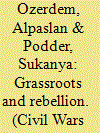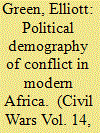|
|
|
Sort Order |
|
|
|
Items / Page
|
|
|
|
|
|
|
| Srl | Item |
| 1 |
ID:
116336


|
|
|
|
|
| Publication |
2012.
|
| Summary/Abstract |
An important aspect in the resolution of civil conflict pertains to the political transition of rebel groups, dissipation of their command structures and reintegration of former combatants. In this paper, we draw on empirical data collected in select communities of Lanao, Cotabato and Maguindanao provinces of Mindanao, Philippines during June 2010 to explore future trends in civilian support for the main separatist rebel outfit in Mindanao - the Moro Islamic Liberation Front (MILF). We test variance in the existence of recruitment pools among the two main Muslim ethnic groups - the Maranao and the Maguindanao. Our findings suggest that recruitment into MILF is not simply about religion or ideology, this is a simplification of its underlying support base. Several factors such as geographic location, especially proximity to Armed Forces of the Philippines camps, and conflict-related impacts of displacement, together with disparity in governance delivery levels, have resulted in divergence in levels of support for the Bangsamoro struggle between the two main ethnic groups. These variables will have an impact on the future existence of the MILF as a rebel movement.
|
|
|
|
|
|
|
|
|
|
|
|
|
|
|
|
| 2 |
ID:
116337


|
|
|
|
|
| Publication |
2012.
|
| Summary/Abstract |
Theories that seek to explain patterns of violence in civil wars frequently pass over the issue of ideology. This paper argues that ideology may shape the use of selective versus indiscriminate violence by an armed group. The role of ideology is examined in the cases of Frelimo in Mozambique and the MPLA in Angola in their countries' wars of independence and civil wars. Using archival and newspaper data, I find that the Marxist-Leninist ideology of Frelimo and the MPLA led initially to their practice of restraint in violence against civilians, and that as elite ideological commitment eroded, this led to a corresponding increase in violence. I also challenge the role played by ideology in Jeremy Weinstein and Macartan Humphreys' group organization theory of civil war violence.
|
|
|
|
|
|
|
|
|
|
|
|
|
|
|
|
| 3 |
ID:
116334


|
|
|
|
|
| Publication |
2012.
|
| Summary/Abstract |
Sub-Saharan Africa has shifted from having a low population density and no population growth in the 19th century to an extremely high population growth today. I argue here that an important cause behind contemporary civil conflict has been this rapid demographic shift. Specifically, I show that low population densities in Africa historically contributed to communal land rights and the creation of large states. In the postcolonial era, however, these two variables have combined with high population growth rates, low levels of urbanization, and rural-rural migration flows to produce large amounts of 'sons of the soil' conflict over land. Evidence from contemporary civil wars in Sudan and the Democratic Republic of Congo supports my theory.
|
|
|
|
|
|
|
|
|
|
|
|
|
|
|
|
| 4 |
ID:
116335


|
|
|
|
|
| Publication |
2012.
|
| Summary/Abstract |
This study explores state stability using various governance and development indicators. We find stability is associated with state capacity and public goods, the legal-rational state, legitimacy, good governance and corruption, income/capita and democracy and human rights. In particular, we show the importance of democracy, legitimacy, rule of law and secularity. Environmental degradation and debt dependency undermine stability. Revenue collection, corruption, rule of law, independent judiciary and exports can be important to stability even in the face of incomplete democracy and lower GDP per capita. These factors are relatively more important in low-income states.
|
|
|
|
|
|
|
|
|
|
|
|
|
|
|
|
|
|
|
|
|